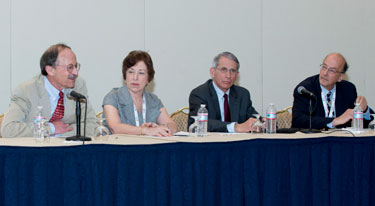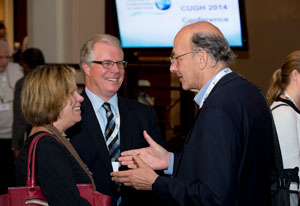Universities meet to consider global health challenges
May / June 2014 | Volume 13, Issue 3
As the deadline approaches for achieving the Millennium Development Goals (MDGs), the global health community must re-evaluate priorities and consider how best to meet the remaining challenges, according to speakers at the fifth annual meeting of the Consortium of Universities for Global Health (CUGH), held in May in Washington, D.C.

Photo courtesy of CUGH
At the CUGH meeting (from left) NCI Director Dr. Harold Varmus,
NIEHS Director Dr. Linda Birnbaum and NIAID Director Dr. Anthony
Fauci discussed new directions for global health research in a
panel moderated by Fogarty Director Dr. Roger I. Glass.
More than 1,500 leaders, researchers, policymakers, educators and students from over 24 nations participated in the three-day meeting, titled "Advancing Global Health in the Post-MDG Era."
The U.S. remains committed to being the global leader in health and development, said President Barack Obama, in a videocast message to attendees. "We changed the way we approached development with a new focus on partnerships that empower countries to break the cycle of poverty and dependence," he said. "We're building the capacity of countries to care for the health of their own people."
Building capacity in Africa to improve health
Nowhere is the impact of this approach more evident than in sub-Saharan Africa, where the U.S. Medical Education Partnership Initiative (MEPI) has spurred countless actions to strengthen medical education and research capacity. Watch the video of the session MEPI: New Paradignm in Capacity Development [Video]."
"The MEPI program has been absolutely transformative," said Dr. Roger I. Glass, director of Fogarty, which co-administers MEPI with the Health Resources and Services Administration (HRSA). Glass, who moderated a panel of MEPI grantees, emphasized how synergies are extending the program's reach. "Many of the MEPI leaders said, 'If we are going to improve medical education in our country we have to include everyone, not just our own institution,'" he recounted. "It was an eye-opener and something we never anticipated."

Photo courtesy of CUGH
Fogarty grantee Dr. Peggy Bentley, of the University
of North Carolina, and Dr. James Tielsch, of George
Washington University, catch up with Fogarty Director
Dr. Roger Glass at the CUGH meeting.
The MEPI investigators cited many examples of how medical and research capacity have expanded in the program's first four years. Dr. James Kiarie of the University of Nairobi said new e-learning facilities have enabled high-level education in rural areas and now 306 medical students are receiving training in specialties ranging from pediatrics to dentistry. Nine have additionally embarked on mentored research projects. Kiarie said, "They report more satisfaction because they are not only taking care of patients but are also doing research training."
In Mozambique, MEPI sparked the creation of master's programs and new research opportunities to encourage faculty to remain in their institutions rather than flock to the private sector, said Dr. Emilia Noormahomed of the University of Mozambique.
A research support center at the University of Zimbabwe has helped nurture skills and has generated 22 proposals, said investigator Dr. James Hakim. In Ghana, research training has led to a number of projects and collaborations with other African institutions," noted Dr. Peter Donkor of Kwame Nkrumah University of Science and Technology.
Over the past decade, Ethiopia has seen the addition of 23 medical schools and a surge in student enrollment, according to Dr. Miliard Derbew of Ethiopia's Adidas Ababa University. He said medical schools now have an extensive e-learning platform, digitized textbooks and networks for sharing information and resources.
NIH leaders see "extraordinary" opportunities for global health research
As capacity builds at African universities, many of these scientists are likely to seek NIH research support. A panel of NIH directors [Video] discussed the opportunities that abound.
While HIV/AIDS, malaria, tuberculosis and neglected tropical diseases are the "Big Four" categories of interest to the National Institute of Allergy and Infectious Diseases (NIAID), it supports research in numerous other areas, according to NIAID Director Dr. Anthony Fauci. His Institute conducts activities in over 100 countries and works to strike a balance between global health need and scientific opportunity.
HIV/AIDS has been the highest priority for the last three decades, he said, with NIH devoting $56.9 billion to its research, half through NIAID projects. The virus, once an unstoppable killer, can now be held at bay by about 30 drugs. "It is also a lesson that when we make a major investment in a global health issue, the real returns are extraordinary," Fauci said. However, he noted that major challenges remain in terms of finding a cure, "so there is still a long way to go."
Prevention is where the focus should be in terms of environmental health, urged Dr. Linda Birnbaum, director of the National Institute on Environmental Health Sciences, which supports about 120 global research projects. She increasingly believes the old adage "a good start lasts a lifetime" should guide thinking on environmental risks, which include air and water pollution, exposure to heavy metals and radon, and other hazards.
Scientists are beginning to understand that early exposures - including in utero - can "significantly" alter the risks and the danger of developing noncommunicable diseases such as asthma, cancer or cardiovascular disease later in life, Birnbaum observed. "So it's really important that we understand we may be setting people up to fail by early life exposures."
The many different types of cancers make it an inherently complex problem, hard to diagnose and hard to treat, said Dr. Harold Varmus, director of the National Cancer Institute. To enhance coordination of global research across his Institute, he established a new Center for Global Health three years ago. Varmus recounted the Center's five goals: to help build cancer registries and develop country plans; address cancers caused by infectious agents; study common risk factors such as tobacco, alcohol and obesity; strengthen health systems to improve capacity for surgery and palliative care; and develop global partnerships.
NCI has also established an annual meeting of global cancer research funders, to share information and coordinate activities, Varmus said.
Neurological disorders are particularly tragic in low-resource settings, said Dr. Walter Koroshetz, deputy director of the National Institute of Neurological Disorders and Stroke (NINDS). He noted the vast majority of people affected in developing countries receive no treatment. The burden of disability is enormous, including conditions related to early child development and across the lifespan, from depression or substance abuse to issues of aging such as dementia. While many of the problems are difficult to solve, he noted, some could be treated easily and cheaply, for example, providing the drug phenobarbital for people with epilepsy. Misinformation and stigma surrounding these diseases are prevalent.
"People with psychiatric disorders sometimes are thought to be possessed and are chained to a tree in the village," Koroshetz said. "So not only do they not get treatment but it's really a question of human rights violations."
Global health interest on campus continues to grow
Increasingly, reaching out to such untreated populations are U.S. universities, whose global health programs have grown substantially over the past two decades and are likely to remain robust, according to a new survey by the Center for Strategic and International Studies, presented at the CUGH meeting. While it is critical students and trainees are exposed to issues of health care disparity and inequity, global health education is also about developing meaningful impact on global health, the study suggested.
Regarding the expiring 2015 MDGs, "We have a huge unfinished agenda, which research is critical for understanding," said Dr. James Tielsch, chair of George Washington University's Department of Global Health. "We can't take our eyes off the ball for either programs or translation of research into policy."
"Our primary challenge is not so much a knowledge deficit but a gap in implementing what we already know will address the enormous challenges before us," observed CUGH Executive Director Dr. Keith Martin.
Student interest in participating in global health continues to grow at all educational levels, the survey indicated. The greatest emphasis is on postgraduate training - offered at half of all institutions polled - but strongest growth was predicted in undergraduate offerings. For instance, among surveyed institutions, the proportion offering global health studies as an undergraduate major in 2009 was zero, but this has risen to 14 percent today and is expected to be at 33 percent in five years. Those offering master's degree options, currently 36 percent of respondents, are expected to rise to 46 percent by 2019.
The overall outlook for global health on university campuses is optimistic, the study found, a sentiment echoed by many at the conference. The report concluded, "While the tremendous expansion of university global health activities raises concerns about future sustainability and growth, there remains tremendous optimism."
More Information
To view Adobe PDF files,
download current, free accessible plug-ins from Adobe's website.